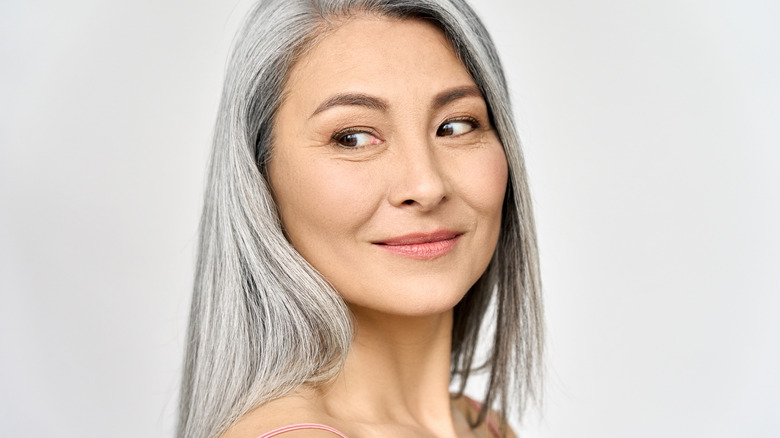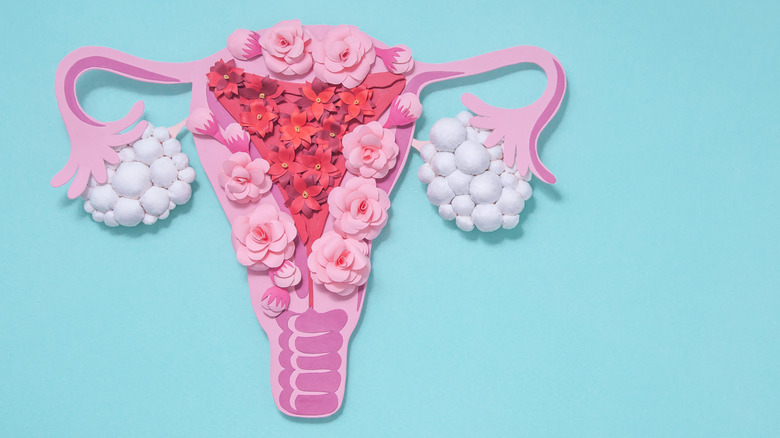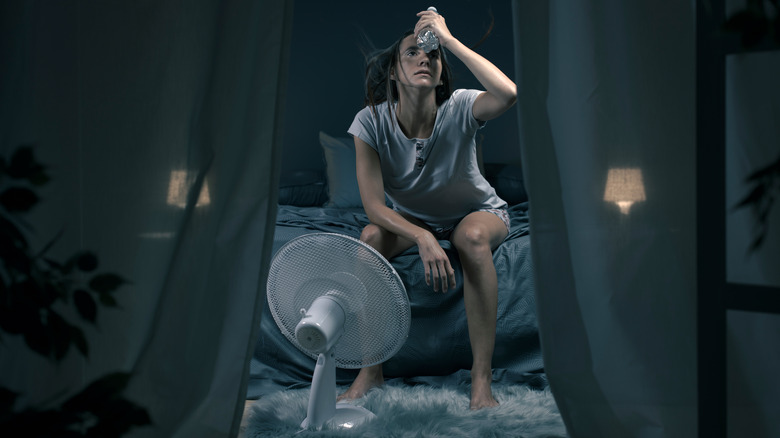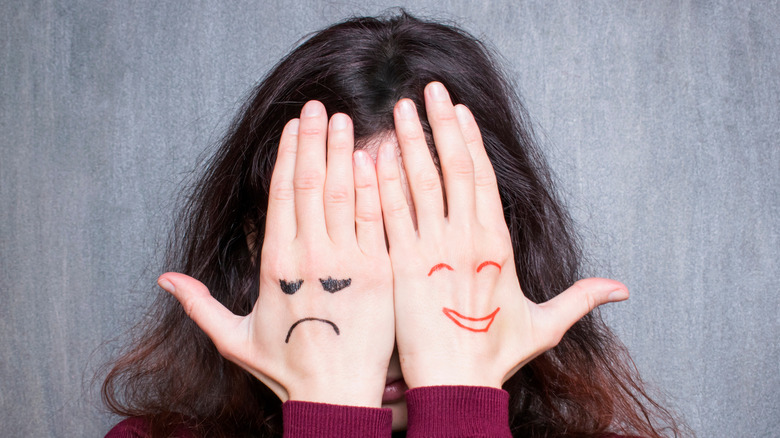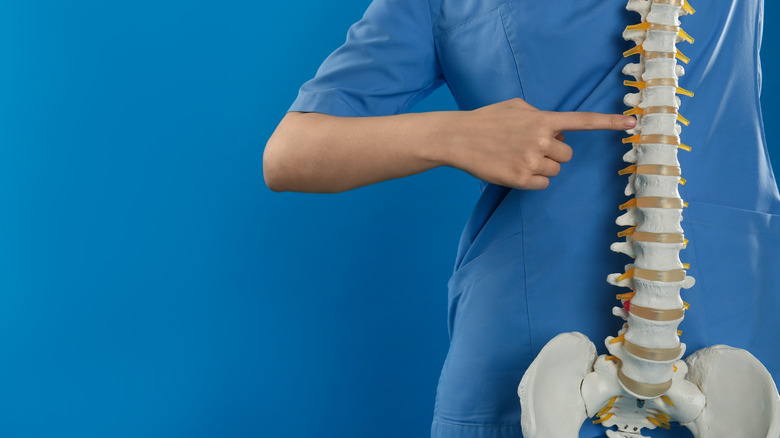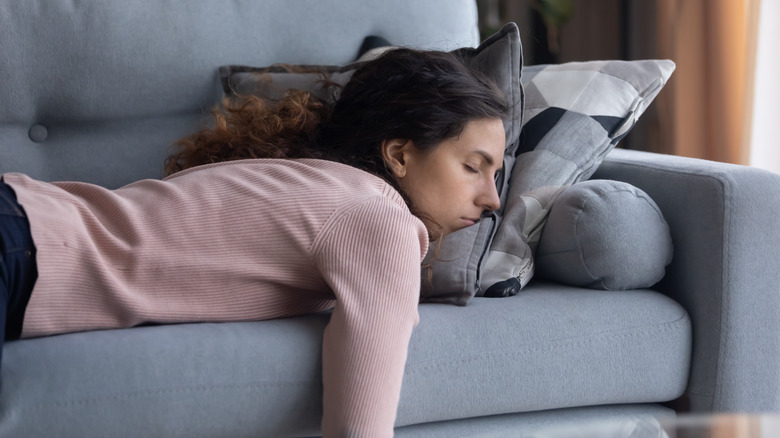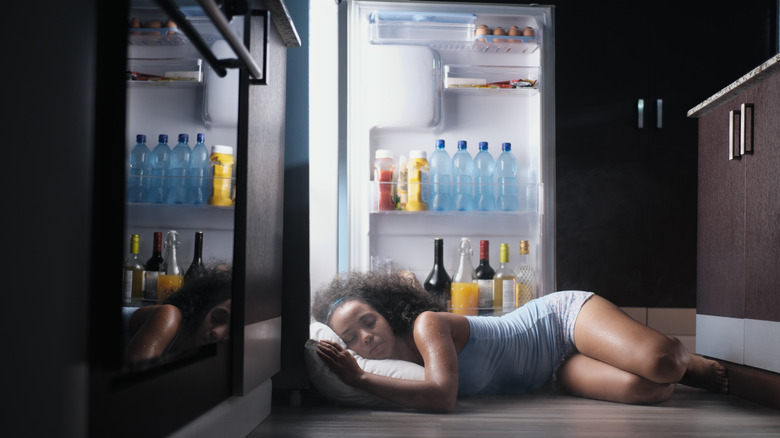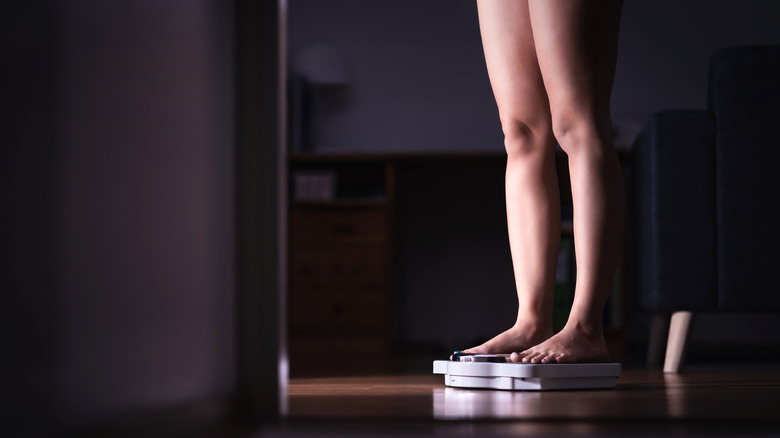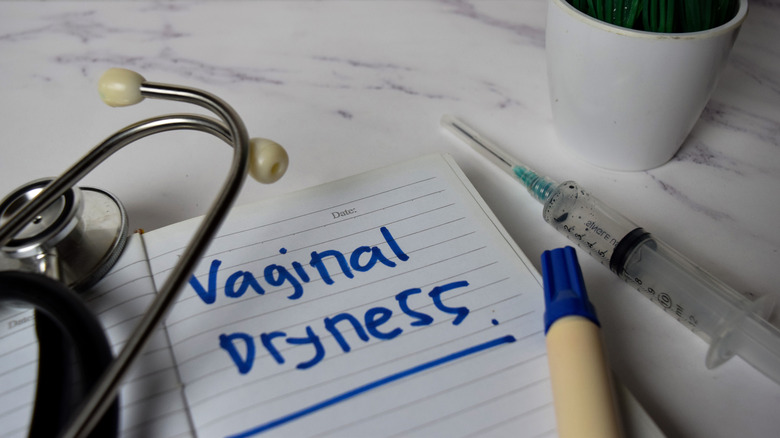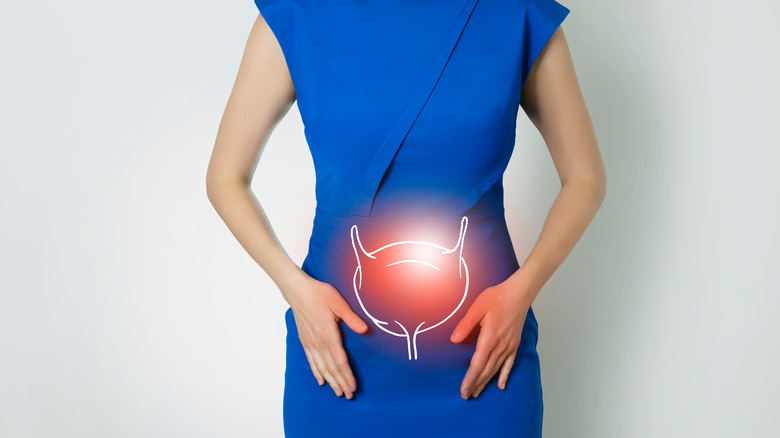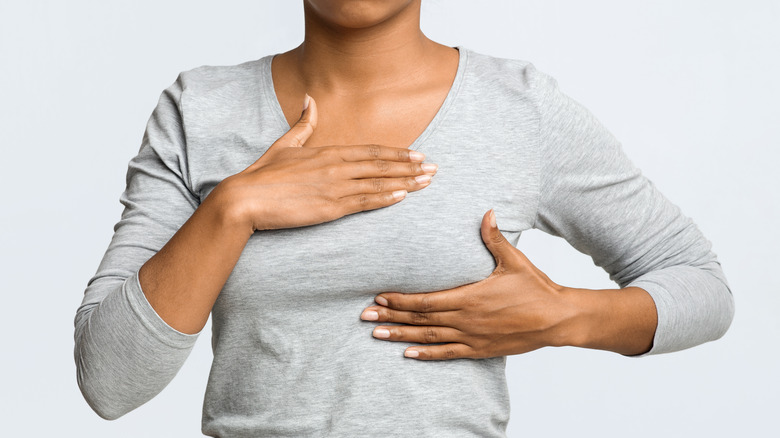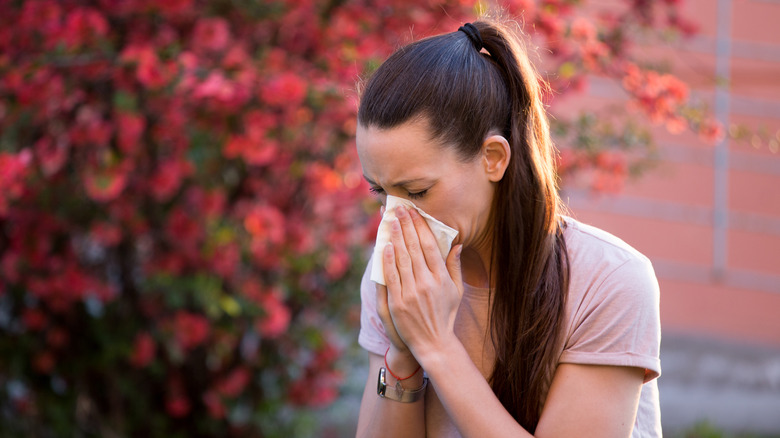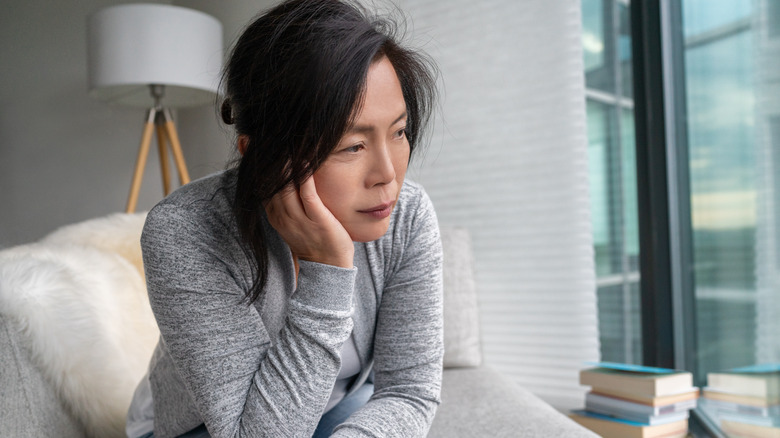What Happens To Your Body When You Go Through Menopause
Just as puberty and the start of the menstrual cycle signals the onset of a female's ability to procreate, menopause and the cessation of menses signals the end of the childbearing years (via WebMD). Women are born with all of their eggs within their ovaries, the organs that make sex hormones. The ovaries produce estrogen and progesterone, which are the hormones that control menstruation. When this cycle crawls to a stop and a woman has her last menses, she is considered to be in menopause. Typically this occurs after the age of 40, though sometimes this process happens prematurely or due to medical intervention (such as chemotherapy to treat cancer). Woman who go into premature menopause can experience the same symptoms as women who begin the change naturally.
Generally women experience perimenopausal symptoms in the year or two leading up to actual menopause, though this transitional phase can sometimes last up to four years. The fluctuation in hormones can cause a host of symptoms that range from uncomfortable to downright dreadful. Some women experience more severe and varied symptoms than others. Read on to find out what really happens in your body as you are going through menopause.
Your levels of estrogen will decrease
One of the main things that happens with the onset of menopause is a lowered production of hormones from the ovaries (via WebMD). Specifically, menopause is when the amount of estrogen produced drops off, and this decrease in estrogen sets the scene for the rest of the symptoms to show themselves. Whether we realize it before menopause or not, estrogen and its BFF, progesterone, make women's bodies and lives what they are. As the hormone production slows with age, women's bodies begin to morph and change from the inside out.
In the perimenopausal phase, the ovaries begin to slowly decrease their production of estrogen. At some point during this phase, your ovaries will stop releasing eggs, at which point the levels of estrogen produced will decline even more quickly. There is a host of complications that come with such a stark decline in estrogen, some of which — like hot flashes — are trademark symptoms of menopause (via Healthline).
You'll get hot flashes
If the first menopausal symptom that came to mind is hot flashes, well, that is pretty standard. Hot flashes, also known as "power surges" in some circles (via Contemporary OB/GYN), have long been the most famed symptom of menopause. "Why?" you ask — because they are dreadful, that is why. Even though hot flashes are super common, the exact mechanism that creates them is largely unknown, though specialists all agree that hot flashes are brought on by the changes in hormones (via Mayo Clinic). Experts tend to think that the hormone fluctuations cause the "thermostat" in your brain to go haywire.
When you experience a hot flash, it feels like your body temperature is rising from the inside out. During a hot flash, your core body temperature never truly rises about a safe limit, even though it can totally feel like it. Generally, they affect the upper half of your body more dramatically and can leave your skin red and flushed from the heat. You might experience dizziness, sweatiness, and heart palpitations. There are a few known triggers to avoid, such as spicy food, alcohol, caffeine, stress, and hot weather. Healthline also suggests practicing some deep breathing exercises and dressing in layers, that you would inevitably shed, to help manage the hot flashes.
You might be moody
As a result of hormone fluctuations, you might get moody (via Medicina). Just as when pubescent girls have severe mood swings due to the hormones swirling around inside of them, mature women are afflicted by a similar phenomenon. Women of menopausal age experience a decrease in the function of their hypothalamic-pituitary-ovarian axis, which is the system that controls female reproduction and hormones (per Biomedicines). In turn, this changes the way that hormones interact with the central nervous system, which can lead to moodiness that ultimately affects women's quality of life. Generally, though, the moodiness only lasts through the menopausal transition, so if you find yourself inexplicably irate while going through the change, rest assured that the dramatic roller coaster of emotions likely won't last forever.
Unfortunately, many women experience these mood swings and report it to feel like a perpetual state of PMS, which does not sound fun (via WebMD). Nurturing activities may help women cope with the overwhelming feelings that can be a part of "the change." For instance, WebMD suggests doing restorative, calming practices such as yoga and meditation. They also recommend nurturing friendships, creativity, and the power of community to help cope with symptoms such as irritability, sadness, apathy, aggressiveness, fatigue, and tension.
You'll lose bone mass
The loss of bone mass and how it relates to the decline in estrogen produced has been well-studied over the years since it can have severe ramifications. The lowered amounts of estrogen can cause the amount of calcium in your bones to decrease, which can lead to osteoporosis (via Healthline). Osteoporosis literally translates to "porous bone," because that is what happens to your bones without the optimal amount of calcium in them (via Healthline). Porous bones can make women more susceptible to fractures, especially in the spine and hip girdle.
Most women experience a major decline in bone mass during the first few years following the loss of their menstrual cycle. Because this is such an oft-studied topic, doctors are aware of, and prescribe, a few lifestyle things to help protect women from more aggressive decline. Experts recommend consuming foods that are high in calcium, such as dairy products and leafy green vegetables. They also recommend supplementing with vitamin D, reducing alcohol consumption, and quitting smoking. Additionally, maintaining a strong exercise routine that includes weight lifting is a great way to help maintain bone density.
Sleep might become complicated
Many women find that sleep disturbances become a regular occurrence when they begin to go through menopause (via Women's Health Concern). Difficulties sleeping are a direct result of lowered estrogen levels. For one thing, hot flashes can happen more frequently at night and cause women to awaken repeatedly. Also, since menopause can cause anxiety and depressive symptoms, the quality of sleep that menopausal woman get can also degrade. Many people with depression experience less restorative sleep than those without it. Furthermore, depression and anxiety can lead to early morning awakening. This is certain to be unwanted if you've spent half of the night tossing and turning in a pool of your own sweat caused by aggressive hot flashes.
Some women may also experience joint aches and pains and bladder issues that can also disrupt what would otherwise be a good night's sleep. The secretion of melatonin, the hormone that is vital for sleep, is negatively affected by the changes in estrogen and progesterone as well. All of these things come together to make getting a restful night of sleep incredibly complicated for women experiencing menopause.
You might become well-acquainted with night sweats
Nighttime hot flashes sometimes take on a life of their own and make even the coolest women overheat during the night (via Medical News Today). Sometimes night sweats are unrelated to hot flashes, other times they are a direct result them. If you wake up in the middle of the night feeling drenched and soggy, that is a night sweat! Because your hormones are changing, the body has trouble with temperature regulation.
Just as with hot flashes, to avoid night sweats experts recommend avoiding certain triggers such as spicy food, caffeine, alcohol, and smoking. If you need to bring your temperature down, Medical News Today recommends running cool water over the wrists, since it can quickly cool a lot of blood vessels. They also recommend enjoying a cool shower in the hours leading up to bedtime. And most obviously, they recommend keeping a fan near your bed and a cool room temperature. All of these things will help keep night sweats to a minimum.
You might gain weight
Potential weight gain is another menopausal symptom — and, you guessed it, the propensity to gain weight is a result of fluctuating levels of estrogen within the body (per Healthline). Lower levels of estrogen allow the body to retain fat more readily. Happily, according to the Journal of Mid-Life Health, many of the menopausal components that lead to weight gain can be overridden with a bit of intention. The elements that can be manipulated are things such as emotional eating in response to the psychological changes you're experiencing. To add to that, as we get older, we tend to slow down and exercise less. Maintaining a healthy exercise regimen is one of the best ways to keep the weight gain to a minimum both during and after menopause.
There is more to the problem of menopausal weight gain than meets the eye; it is not just about more mature women wanting a smaller frame. A more robust waist circumference is directly linked to higher incidences of cardiovascular and metabolic disease. Doctors continue to recommend daily exercise and proper, healthful nutrition as the main ways to combat this.
Your vaginal tissues will change
Vaginal dryness is another well-known side effect of menopause. As women's bodies move beyond their childbearing years, the amount of lubrication that the vagina naturally produces decreases. According to the International Journal of Women's Health, 50-60% of postmenopausal women experience vaginal dryness and vaginal atrophy. Both side effects can cause unpleasant symptoms including burning, itching, discomfort, and pain while urinating. As the lining of the vagina changes due to lowered estrogen, it can become thinner, which will influence its pH. If the pH of the vagina has trouble finding its way back to homeostasis, you might become more susceptible to bacterial overgrowth and urinary tract infections.
The International Journal of Women's Health reports that many postmenopausal women express embarrassment in discussing this with their doctors and instead choose to suffer through it on their own. However, when this issue is confronted in a timely manner, doctors can help patients find appropriate treatment options. With the correct therapeutic modalities in place, women can increase their quality of life and vaginal health.
Sex will be different
As you can imagine, the drastic changes in your hormones lead to changes in sex. Because of the vaginal dryness resulting from declines in estrogen levels, many women experience pain during sex due to the lack of lubrication, and may opt to use an over-the-counter lube to prevent painful intercourse (via International Journal of Women's Health). Beyond that, lowered estrogen levels decrease feelings of arousal in many women. According to one review of existing literature on sexual disfunction in women, 68-86.5% of menopausal women experience sexual problems (via Reviews in Obstetrics and Gynecology). This range is actually higher than the number of women experiencing vaginal dryness, which further confirms the effect menopause has on libido.
Why does this happen? Decreased estrogen levels decrease blood flow to the vaginal tissues, which can cause the tissues to become thinner (via Medical News Today). The thinner tissues can be less sensitive to sexual stimulation. This can sometimes leave women sexually unfulfilled or even in pain during sexual experiences. Estrogen therapies can help many women engage in comfortable, enjoyable sex as they get older. However, hormone replacement-type therapies should only be pursued under the watchful eyes of your doctor.
You might have to pee more
Many women have increased urges to urinate during the menopausal and postmenopausal phases (via Healthline). Beyond affecting a woman's ability to enjoy a full night's sleep, increased urination can come with a side of incontinence. Incontinence is am umbrella term used to explain any type of bladder leakage in both men and women (via Healthline). Some women do not experience incontinence with menopause and perhaps only experience a mildly more frequent urge to urinate. In other cases, women may find that they need to pee after laughing, coughing, sneezing, or working out. In slightly more severe cases, women may feel some urine actually leak out while engaging in any of the above activities. As we age, our bladder muscles grow weaker, which can exacerbate this problem.
Kegels are a fairly well-known way to help build up the muscles surrounding the bladder to help prevent episodes of incontinence (via Mayo Clinic). Pelvic floor training, as it is also known, can be done anywhere and at any time with just a bit of intention. The most common way to find the proper muscles to flex during Kegels is to go to the bathroom to urinate and stop the flow mid-stream. After identifying those muscles, you can graduate to performing Kegels without sitting on the toilet and peeing. One way to conceptualize this process is to imagine that you are picking up a small item with those muscles. You'll draw the muscles up and in, hold isometrically for three to five seconds, and then release. For best results, try to squeeze in three sets of ten to fifteen repetitions per day.
Your skin and hair textures might change
As you begin your menopause journey, it is likely that the textures of your skin and hair will change as a result of fluctuations in progesterone and estrogen levels. Hair loss is a super common complaint among women going through menopause. One article published in Menopause Review a study that explains why it is so important for women of a certain age to follow a healthy, nourishing diet: By ensuring that they are consuming enough keratin-forming amino acids, menopausal women can preserve the integrity of their strands.
Women over 50 also have an increased likelihood of having dry, brittle nails (via Dermatology and Therapy). Ensuring that you are consuming enough amino acids is a great way to solve this problem as well. Amino acids are the building blocks of protein, which can help create healthy connective tissues within your body. Experts recommend supplementing with biotin, a vitamin also know as B7, to help fortify the tissues that make up your fingernails, toenails, and hair.
Your breasts might get sore
If you thought you'd be free of breast soreness and tenderness after PMS and pregnancies, think again. The same way your hormones can create breast tenderness during those stages of life, they can also cause the same problem on the opposite end of your childbearing years (via Medical News Today). Sore breasts, also called mastalgia, occur because as a woman's hormones fluctuate, so does the amount of water she retains. Menopausal breast pain is essentially bloating in the breasts, which makes them more tender to the touch. Most women who experience this only do so during hormonally chaotic times, such as throughout perimenopause. Most women do not experience breast tenderness after the culmination of menopause. If you find yourself with tender and sore breasts years in the postmenopausal phase, experts urge you to contact your doctor to ensure a deeper cause isn't taking root.
To combat uncomfortable breast sensations, Medical News Today recommends ensuring that you are consuming plenty of fluids, as dehydration is likely to make the pain worse. Beyond that, they recommend over-the-counter medications such as ibuprofen to help manage the pain and discomfort.
Your allergies might get worse
According to an article published in ISRN Allergy, sex hormones can play into one's susceptibility to allergies. Many women experience worsened allergy symptoms as they find their way through their menopausal years. Allergy responses can present as sneezing and a running nose, or itching and rashes on your skin. During this time period, female bodies experience spikes in histamines, a chemical that causes allergy reactions. Estrogen can affect your body's ability to metabolize histamine, which is why many pregnant and menstruating women experience similar symptoms in regards to allergy responses.
To ensure that you are getting proper care for your condition, doctors might prescribe an elimination diet to help exclude common food allergens (via Prime Women). The most effective way to care for menopause-induced allergies is by consuming a diet low in histamines. Histamines can be found in shellfish, many aged meats and cheeses, and a lot of fermented food. By avoiding them in your diet, your body is less likely to become overloaded by histamines, thus leading to less intense allergic reactions. Alcohol and black and green teas can also inhibit your body's ability to metabolize histamines, so if you are feeling increased allergies and are beginning or completing menopause, it is best to avoid those substances.
You might develop or experience worsened anxiety
Menopause and the subsequent decrease in estrogen can wreak havoc on your system as your body tries to adjust to the changes. Changing levels of hormones can create myriad complications in the body, many of which may lead to anxious feelings (via Medical News Today). To add insult to injury, the hormone changes can actually affect the brain and cause anxiety.
Some women and their doctors choose to utilize hormone replacement therapy (HRT) to combat symptoms of anxiety during this phase of life. In more severe cases, a doctor may prescribe antidepressants to help combat the symptoms. However, many women have reported these medications to have negative effects on their sex lives. Because treatment for many menopausal symptoms is so nuanced, it is important to chat with your doctor about your symptoms. They likely have the knowledge to help ease your symptoms and guide you through this big life change in a graceful manner.

